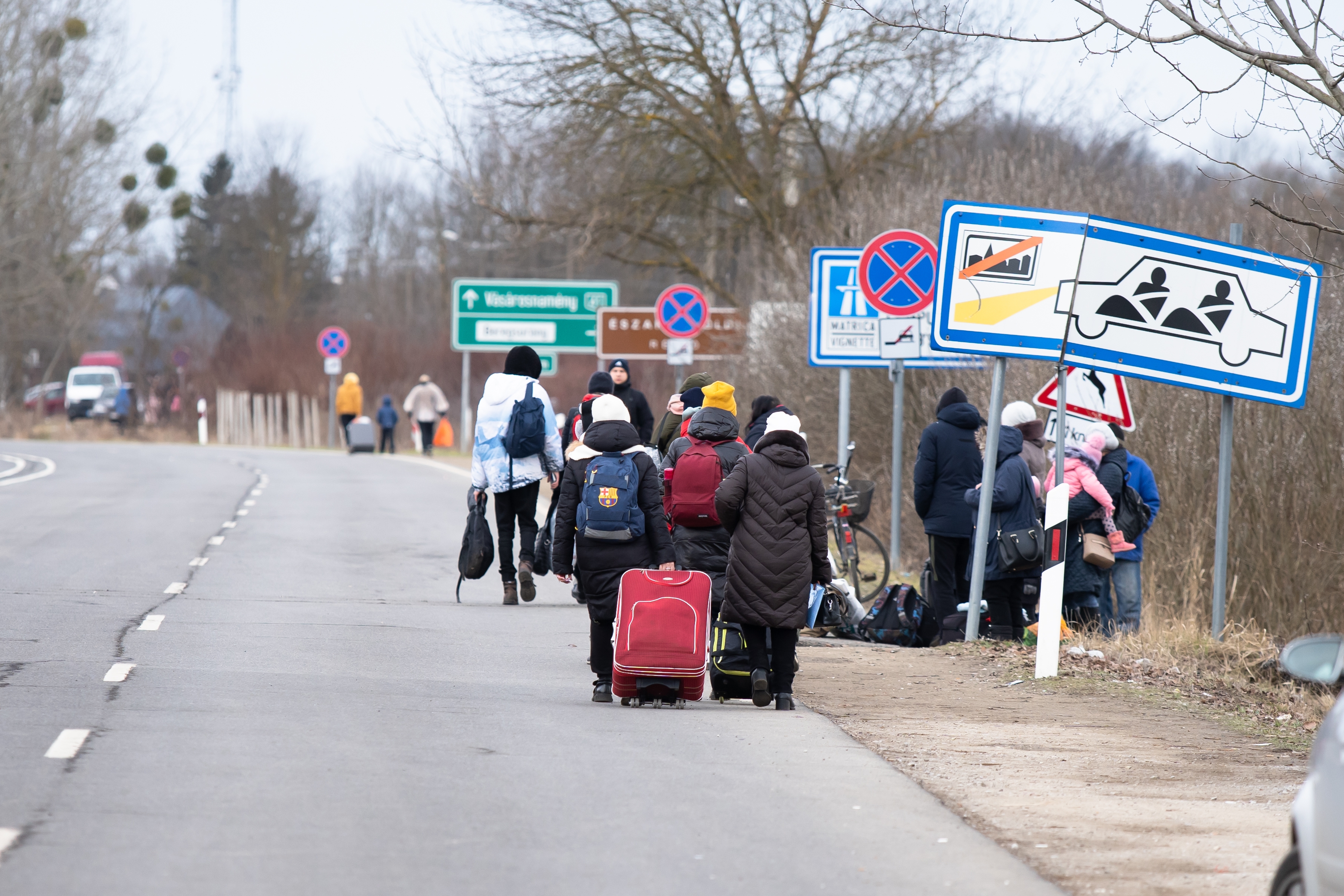Ukraine announced on Tuesday that Russia is withdrawing some troops from the region around Kharkiv, Ukraine’s second-largest city and a crucial base for the Ukrainian military. The announcement comes after Ukrainian soldiers recently recaptured towns and as top U.S. intelligence officials told senators that President Putin was aiming for a longer, wider war. Nick Schifrin reports.

As a nonprofit journalism organization, we depend on your support to fund coverage of global conflicts. Help us continue funding the hard costs of in-depth coverage of the Ukraine invasion—including travel, hostile environment safety training, and the increased security expenses that arise from reporting in war zones.
Read the Full Transcript
Judy Woodruff: Congress is considering a new aid package for Ukraine tonight, including an additional $40 billion in weaponry and economic and humanitarian assistance.
This comes as top intelligence officials told senators today that Russia's President Putin is aiming for a longer, wider war, not just in the eastern Donbass, but with further flash points along Ukraine's southern coast.
National Intelligence Director Avril Haines warned such plans could push the conflict down a devastating new path.
Avril Haines, U.S. Director of National Intelligence Nominee: The uncertain nature of the battle, which is developing into a war of attrition, combined with the reality that Putin faces a mismatch between his ambitions and Russia's current conventional military capabilities, likely means the next few months could see us moving along and more unpredictable and potentially escalatory trajectory.
Judy Woodruff: Haines added that Putin seems to be counting on Western resolve to weaken over time.
Also today, the Ukrainian government announced that Russia is withdrawing some, if not all, of its troops from the northeastern region around Kharkiv, Ukraine's second largest city and a crucial base for its military.
The announcement comes after Ukrainian soldiers recently recaptured towns, including one east of the city, where Nick Schifrin reports tonight.
Nick Schifrin: East of Kharkiv, Ukrainian soldiers are pushing forward.
They patrol an area recently liberated from Russian troops, and now they're preparing for a counterattack. They build defensive positions, foxholes that will be linked to make a new line of trenches, made confident by recent success.
And what is the threat from the Russians in this location?
Capt. Yan Fidra, International Legion of Ukraine: Mostly artillery and the — artillery and mortars. Also, this could be like small recce groups, but, like, we're ready to engage.
Nick Schifrin: Captain Yan Fidra's mission is to prevent Russian troops from moving through here south to the Donbass. Last week, they came under fire by Russian cluster bombs.
Capt. Yan Fidra: One of our soldiers died during the attack. Our medics tried to help him, like, but he was dead before the body hit the ground.
Before we could take his body away, like, me and a few soldiers just spent a couple of hours with his body, like, in that area.
Those woods in front of us, they shooting at us from there.
Nick Schifrin: We first met then Lieutenant Fidra in 2016 on the front line in Eastern Ukraine faced off against Russian-backed separatists.
How's your leg?
Capt. Yan Fidra: Feeling better.
Nick Schifrin: We met him again this past March after he was shot through the leg defending Kyiv.
Capt. Yan Fidra: First two weeks, when I was in the unit, like, I couldn't — I barely could walk, but I was walking on it. And, like, you see, I'm good right now.
Nick Schifrin: Why or how are the Ukrainian forces around Kharkiv gaining such success right now?
Capt. Yan Fidra: Mostly, the Russians, they're using right now mixed units. They're not organized. And that gives us more big opportunities like to push them back.
They don't calculate their fire. And our artillery, they can find the positions, calculate the fire, and just destroy their positions.
Nick Schifrin: His men are a company in Ukraine's International Legion. They're all foreigners, who write messages on their RPGs to the Russians they target, and are paid and armed by the Ukrainian government. Some have faced combat, but never against a modern military.
Steve is from Washington state.
Steve, International Legion of Ukraine: There are a number of us here who've been in plenty of gunfights before. And we all said the same thing. Getting into a gunfight with another human being is a different animal.
Here, there's no fighting back against death that falls from above.
Nick Schifrin: How long will you stay?
Steve: As long as it takes. I'm here until we win.
Capt. Yan Fidra: You have two triggers.
Nick Schifrin: They're just learning how to use the American anti-tank weapon the Javelin, so effective because it can be used from cover quickly.
Capt. Yan Fidra: Fire, forget it, and that's all.
Nick Schifrin: That's allowed Ukrainian soldiers to destroy hundreds of Russian tanks. They refer to this as a lollipop, the shape of a turret blown off the tank body. This is another village, Mala Rohan, liberated a month ago.
Today, Ukraine fires artillery from nearby, but hasn't cleaned up abandoned Russian barracks, with discarded Russian uniforms and even Russian borscht, the fields that residents used to till, the final resting place for a Russian helicopter; 81 years ago, the Nazis occupied Mala Rohan Two months ago, the Russians occupied and tried to convince these villagers to go with them to Russia, including 48-year-old Oksana.
Why did you refuse their offer to go to Russia?
Oksana, Mala Rohan Resident (through translator): I don't know. I had a bad feeling, because I didn't believe that Ukrainians would reach Russia without an incident. I didn't trust the Russians that I would be safe.
(EXPLOSION)
Nick Schifrin: Do you ever get used to the sound?
Oksana: No.
Nick Schifrin: She walks me through the village past a destroyed car. You can still see the tracks of the tank that ran it over.
So what happened here?
She says a cluster bomb landed right outside their house, throwing shrapnel at the front door. She stayed, despite her husband's wanting to leave, because of her cats. They bear the wounds of this war, as do families that once considered themselves cross-border. Oksana was born in Russia and moved to Ukraine when she was 12.
Oksana (through translator): I feel sorry for Russians who did this to us. No one will respect them after what they have done, even though I'm Russian myself. I don't know. It's hard to explain. Something feels wrong in my soul.
Nick Schifrin: For weeks Russia used Mala Rohan to bombard Kharkiv just 12 miles to the west. The fiercest fighting in this area took place in a village up the road, Vilkhivka; 8,000 people used to live here. Now it is no more than 50.
And even though the major fighting ended weeks ago, this place is a ghost town. There is literally nobody out on the streets. And parts of this village still smell acrid. You can still smell the war.
The Russian army didn't bother to pick up their dead. Dozens of homes took direct hits from Russian artillery, and in the street, leftover Russian munitions just a few feet from the colored tires that outline a playground.
In this village in ruins, we found Oleksandr. He grew up here and said he would never leave, no matter what.
What's life like here today? Is there any food? Is there any water?
Oleksandr, Vilkhivka Resident (through translator): Water? What water? Water, gas, electricity? The wires have been cut. What are you talking about? Food is scarce. Some people go to the city. Some people share their food. Humanity is being tested.
Nick Schifrin: So what happened here?
Down the road, Yaroslav Bodyrev shows me what used to be the back of his friend's home, blown out by an artillery shell just two weeks ago.
Yaroslav Bodyrev, Vilkhivka Resident (through translator): When the fighting was very heavy, people were hiding in the basements and had to take all their food with them. And, at some point, I was living on the street, all by myself.
Nick Schifrin: He's living here now, despite the damage. And he too vows to never leave.
Yaroslav Bodyrev (through translator): I never could understand how people could live in Syria. They have war for many years. And people just go about their lives. The same for us here. We got used to it.
And now, when it's quiet, I have this strange feeling that something is missing.
Nick Schifrin: A lot is missing here, including the children who used to fill the villages' only school, now bombed and burned.
For the "PBS NewsHour," I'm Nick Schifrin in Vilkhivka.
Judy Woodruff: And a reminder that our coverage of Ukraine is supported in partnership with the Pulitzer Center.










